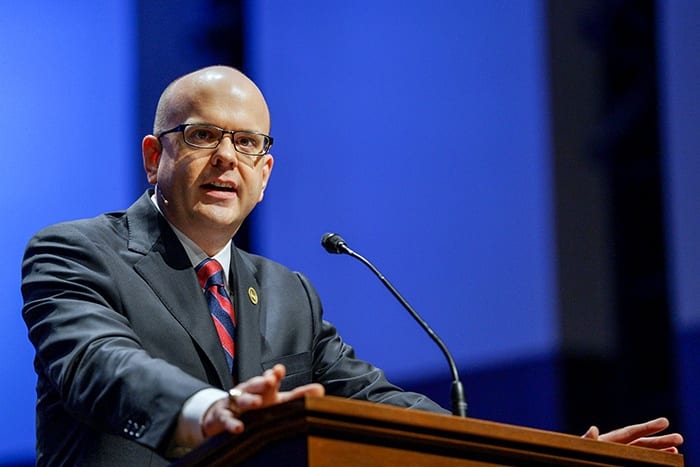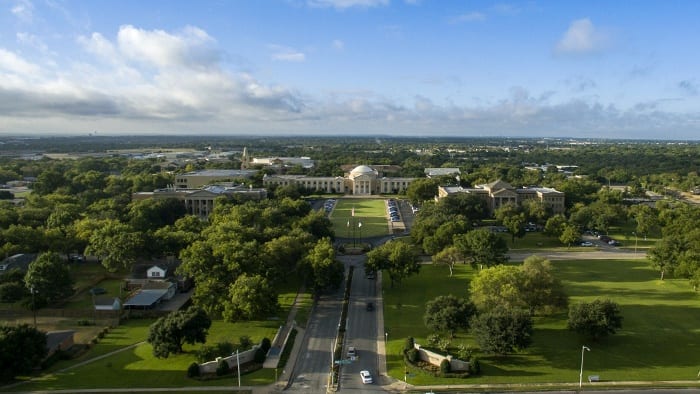
Adam Greenway, SWBTS president
Legal counsel for Southwestern Baptist Theological Seminary sent a letter to Southern Baptist Convention (SBC) Executive Committee (EC) members yesterday (Feb. 21) defending the school’s decision to suspend two of its trustees during an investigation of alleged misconduct that began last fall.
The letter, obtained by the Biblical Recorder, was intended to offer a “more complete picture” of the issues in light of a memo sent to EC members two days earlier by the EC’s own legal counsel, James Guenther and James Jordan. The EC memo argued the “suspension” effectively removed trustees from their positions, a right solely held by SBC messengers.
Michael Anderson, representing Southwestern, said the memo “omitted key facts” and “misrepresented” the seminary’s actions.
Why were Southwestern trustees ‘suspended’?
In September 2020, Southwestern and Baylor University took legal action against the Harold E. Riley Foundation, alleging that some of the foundation’s trustees orchestrated a “secret coup” to take control of the organization and strip Southwestern and Baylor of their status as beneficiaries of the foundation’s assets.
Two of the defendants, Charles Hott and Thomas Pulley, were Southwestern trustees at the time. The officers of the seminary’s board temporarily suspended Hott and Pulley while the investigation was ongoing.
Foundation president Mike Hughes and foundation trustee August “Augie” Boto, former EC vice president and interim president, were among those accused of self-dealing and misuse of charitable funds.
The lawsuit was settled in early February 2021. As part of the deal, Hott, Hughes and Boto agreed to resign from the foundation’s board and refrain from seeking or accepting any future employment or service to any SBC entity or Texas charity. Pulley resigned his board positions prior to the settlement.
Southwestern and EC disagree
While the investigation of alleged misconduct was ongoing, EC officers, staff and legal counsel urged Southwestern to rescind its suspension of Hott and Pulley and reinstate them as active members of the board.
Email correspondence included in Anderson’s letter reveals a months-long back-and-forth between the two SBC entities over the issue.
In the EC’s Feb. 19 memo, Guenther and Jordan argue that Southwestern’s “suspension” of Hott and Pulley “effectively removed them as trustees.” The election and removal of trustees is the sole right of the SBC, they said.
Southwestern pushed back in its letter, saying (1) it did not remove trustees but rather acted to address trustee misconduct; (2) the EC overstepped its bounds by demanding action related to Southwestern’s trustees, the sole right of the SBC; and (3) the seminary’s right to govern itself is a key part of accreditation standards.
“These issues are bigger than Southwestern Seminary,” SWBTS President Adam Greenway told the Recorder, “they go to the heart of historic Southern Baptist polity that has served us well for nearly 176 years. One of our treasured principles is the primacy and authority of the churches. Governance of Southwestern Seminary, and every other SBC entity, is a shared governance between the messengers duly elected by the churches of the Southern Baptist Convention and entity trustees duly elected by those SBC messengers.
“The actions of the Officers of the Executive Committee have attempted to alter our cherished polity and create a role for this group itself in this governance, infringing upon a right that is exclusively given to the Convention. This kind of usurpation of authority has been attempted at several points throughout our history and, as our forebears did, we must resist any and every move towards a centralized super board. The Southern Baptist Convention, Southwestern Seminary, and all of our entities belong to the churches of the Southern Baptist Convention, not a select group of elites gathered in Nashville attempting to assert authority for themselves totally incompatible with our polity.
“Beyond the critical principle of Baptist polity at stake in this dispute is the underlying problem of trustees whose improper conduct has now been demonstrated in the recently announced legal settlement of the Harold E. Riley Foundation lawsuit in which the seminary’s position was entirely vindicated. The Executive Committee Officers’ request concerning the suspension of the two trustees would have permitted individuals to participate in deliberations of the board of trustees in matters in which their own conduct and breach of duty put the interests of the institution at risk. The trustees of Southwestern Seminary had both the right and the duty, which they courageously fulfilled, to protect the integrity of the board in light of the central involvement in the now resolved legal matter.”
The EC’s Missions and Ministry Committee took up the issue in a meeting on Feb. 23. The group decided to form a task force to study how to balance the SBC’s “sole membership” of its entities with the needs of entity trustee boards to manage urgent matters involving trustees.
(This article was updated after its initial posting to clarify the terms of Southwestern’s legal settlement.)

